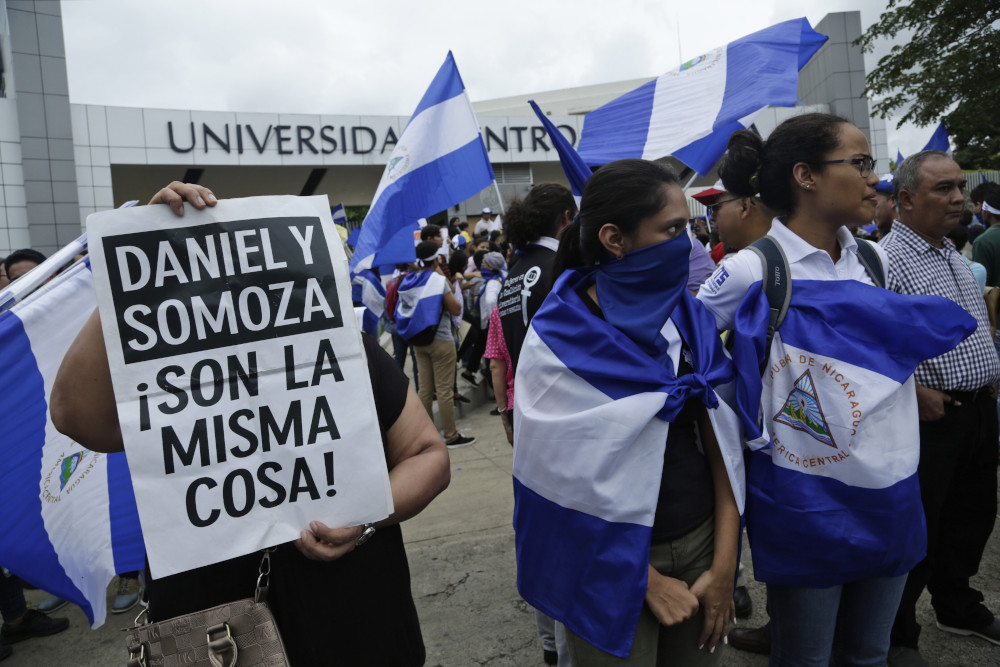
Demonstrators protest outside the Jesuit-run Universidad Centroamericana, UCA, demanding the university's allocation of its share of 6% of the national budget in Managua, Nicaragua, on Aug. 2, 2018. The Jesuits announced Wednesday, Aug. 16, 2023, that Nicaragua's government has confiscated the UCA, one of the region's most highly regarded colleges. (AP Photo/Arnulfo Franco, File)
Nicaragua's government has confiscated a prestigious Jesuit-run university alleging it was a "center of terrorism," the college said Aug. 16 in announcing the latest in a series of actions by authorities against the Catholic Church and opposition figures.
The University of Central America in Nicaragua, which was a hub for 2018 protests against the regime of President Daniel Ortega, called the terrorism accusation unfounded and the seizure a blow to academia in Nicaragua.
The government did not confirm the confiscation or comment on the Jesuits' statement.
The Jesuit order said it received a judicial order Aug. 15 notifying it of the confiscation. It said the government seized all the university's property, buildings and bank accounts.
"With this confiscation, the Ortega government has buried freedom of thought in Nicaragua," said María Asunción Moreno, who was a professor at the university until she was forced into exile in 2021.
The order quoted the government as claiming the university "operated as a center of terrorism."
"This is a government policy that systematically violates human rights and appears to be aimed at consolidating a totalitarian state," the Society of Jesus of Central America said in a statement.
Assistant Secretary of State for the Bureau of Western Hemisphere Affairs, Brian A. Nichols, said in a tweet that the seizure of the university "represents further erosion of democratic norms and a stifling of civic space by Ortega-Murillo," referring to vice president and first lady Rosario Murillo.
The university, known as the UCA, has been one of the region's most highly regarded colleges. It has two large campuses with five auditoriums, engineering laboratories, a business innovation center, a library with more than 160,000 books in Spanish and English, a molecular biology center and facilities for 11 sports. Of the 200,000 university students in Nicaragua, an estimated 8,000 attend UCA.
Founded 63 years ago, UCA also houses the Institute of History of Nicaragua and Central America, which is considered the main documentation and memory center in the country, equipped with its own library, a newspaper library and valuable photographic archives.
Since December 2021, at least 26 Nicaraguan universities have been closed and their assets seized by order of the Ortega government with a similar procedure. Seven of those were foreign institutions.
In April, the Vatican closed its embassy in Nicaragua after the country's government proposed suspending diplomatic relations.
Two congregations of religious sisters, including from the Missionaries of Charity order founded by Mother Teresa, were expelled from Nicaragua last year.
Advertisement
The expulsions, closures and confiscations have not just targeted the church. Nicaragua has outlawed or closed more than 3,000 civic groups and non-governmental organizations.
In May, the government ordered the Nicaraguan Red Cross shut down, accusing it of "attacks on peace and stability" during antigovernment demonstrations in 2018. The local Red Cross says it just helped treat injured protesters during the protests.
In June, the government confiscated properties belonging to 222 opposition figures who were forced into exile in February after being imprisoned by Ortega's regime.
Those taken from prison and forced aboard a flight to the United States on Feb. 9 included seven presidential hopefuls barred from running in the 2021 election, lawyers, rights activists, journalists and former members of the Sandinista guerrilla movement.
Thousands have fled into exile since Nicaraguan security forces violently put down mass antigovernment protests in 2018. Ortega says the protests were an attempted coup with foreign backing, aiming for his overthrow.







